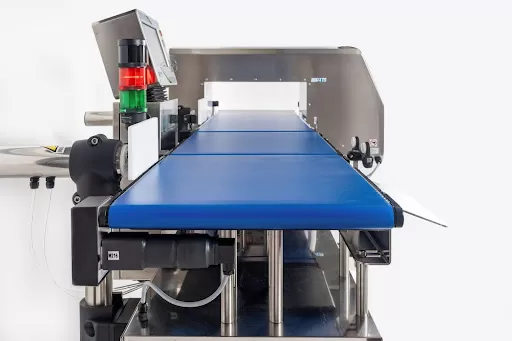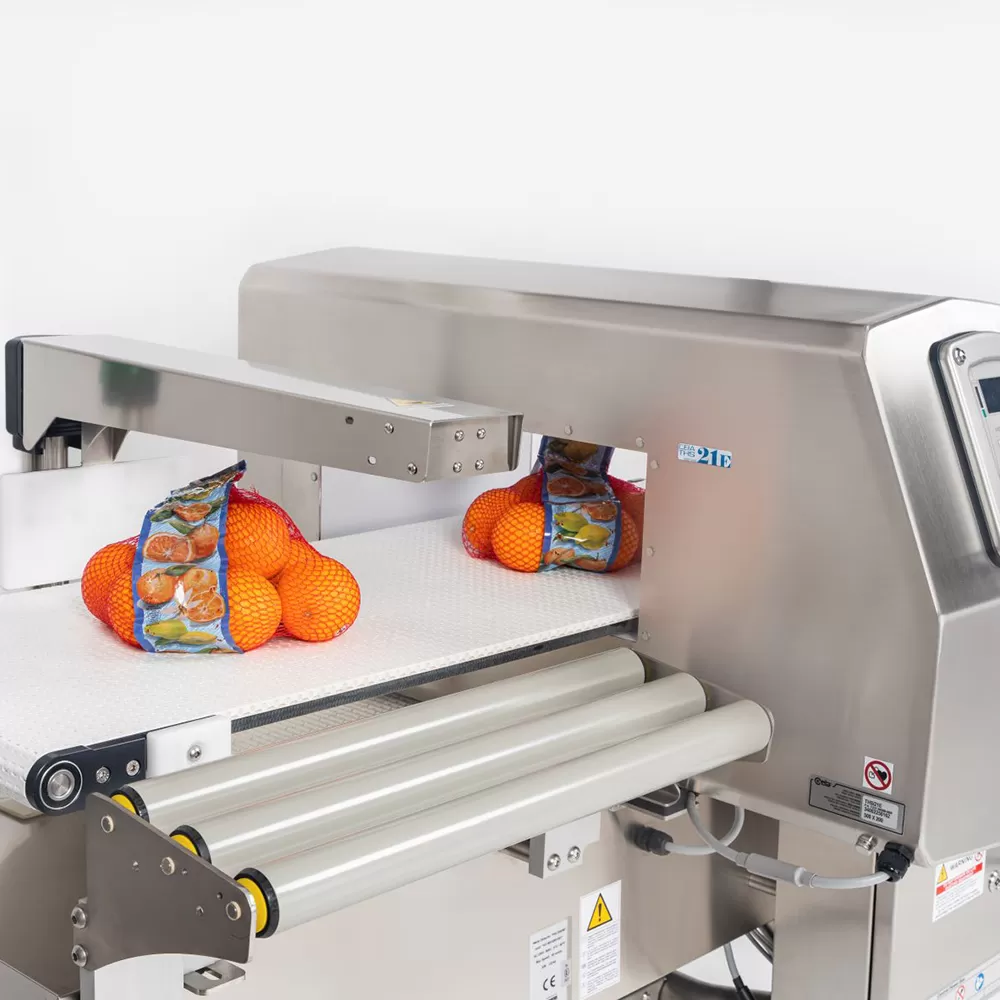
16 December 2024
5 useful tips for choosing the most suitable metal detector
Guide to choosing an industrial metal detector: discover how to improve quality and safety in your production line
5 useful tips for choosing the most suitable metal detector
16 December 2024
Metal detectors are essential tools for ensuring product quality and conformity in many production sectors, especially in the food industry, where regulations require strict quality control for consumer safety.
The presence of metal contaminants, even of microscopic dimensions, can in fact compromise the integrity of the final product, with potential health risks and significant economic consequences for companies.
Metal detectors integrated into production lines play a crucial role in detecting and separating these contaminants before products reach the market, ensuring full compliance with applicable regulations and quality standards. However, there is no one-size-fits-all solution: each production process has its own specific characteristics which require the use of custom-designed devices. Factors such as the type of product to be inspected (dry, wet, liquid or packaged), production volume, required sensitivity and environmental conditions of the line significantly influence the choice of the most suitable model.
Choosing the right metal detector means not only ensuring more stringent quality control, but also optimizing operating costs, reducing waste and improving overall production process efficiency. For this reason, it is essential to carefully evaluate the needs and characteristics of each machine, focusing on solutions that combine precision, reliability and compatibility with systems already in use.
Let’s see more specifically what are the characteristics and advantages of an industrial metal detector and all aspects to consider in order to make an informed choice.
As we have seen, an industrial metal detector is a device designed to ensure that products intended for the market are free of metallic contaminants. The operation is based on an electromagnetic principle: the metal detector generates a magnetic field through which products are passed. This field, usually created by transmitting and receiving coils, is highly sensitive to alterations caused by metallic materials.
When a metal particle passes through the magnetic field, it alters the generated signal, creating a distortion that is immediately detected by the system. The alteration activates an alarm or automatic ejection system, which separates the contaminated product from the production line, ensuring a continuous and uninterrupted process.

Industrial metal detector machines can detect different types of metals, including:
One of the key features of an industrial metal detector is its sensitivity, which is the ability to detect extremely small particles. The most advanced devices are able to adapt to a variety of applications, ranging from the food industry where it is crucial to detect microscopic contaminants, to manufacturing where larger particles might be acceptable. Another important feature is the use of multiple frequencies or multi-spectrum technologies, which improve the effectiveness of detection, especially when it comes to products with high natural conductivity, such as meat, cheese or liquids.
The selection of the best metal detector requires a thorough analysis and careful assessment of several key factors to ensure that the selected device is able to meet all production, regulatory and quality requirements. Taking these aspects into account will allow you to optimise your investment, improve efficiency and reduce the risks of contamination. Here are five key factors to consider:
1. Understanding your company’s needs
The first step is to clearly define the specific needs of your industry and production line. What materials do you need to detect? Are you in the food, pharmaceutical or manufacturing industry? Requirements vary greatly depending on the product type: for example, detection becomes more difficult for aluminized packages that already contain metal inside the package, or if the product is wet or acidic (as in the case of tomatoes or yogurt) or if it has a complex composition. It is more difficult even if the products already contain iron, as in the case of red meat or cheeses. The sensitivity of the machine must therefore be adapted to the size and composition of the products to be analysed. Also consider the volume of production: a high capacity line will require a device that can work quickly without compromising accuracy. Carefully examining these aspects will help you to identify the best options available on the market.

2. Evaluate sensitivity and accuracy
Sensitivity and accuracy are two key parameters for the choice of a metal detector. Sensitivity refers to the metal detector’s ability to detect microscopic metal particles - measured by the smallest particle it is able to detect for each type of contaminant, measured in mm of diameter -, while precision ensures that the device can distinguish between true contaminants and intrinsically conductive materials. The sensitivity of the model should then be chosen according to the type of product and the different applications. For example, if you produce packaged snacks, you may need to detect very small particles, while other products may require less stringent thresholds. Prior analysis of these aspects will help you to reduce waste and improve the efficiency of quality control.
3. Evaluate ease of integration and use
A metal detector must be able to integrate seamlessly into the existing production line. Choose a tailored solution, considering factors such as modular design, compatibility with automation systems and ease of installation. In addition, the user interface should be simple and intuitive, allowing staff to easily configure and monitor the device. Also consider the possibility of integrating industrial automation software with reporting, data analysis and remote control of machines, which will allow you to simplify processes and control the best management of each production phase, thus improving overall quality and efficiency.
4. Certification and regulatory compliance
Regulatory compliance is essential, especially in the food and pharmaceutical sectors. Make sure that the metal detector you choose is HACCP and GMP compliant, and designed to meet the highest safety and quality standards. Another important aspect to consider is the sanitization: if the metal detector must operate in environments or production lines particularly hostile or difficult, choose a model that has an IP protection suitable for the type of washing, more or less frequent, and with different aids and temperatures (for example high pressure or high temperature). Models with IP54 are resistant to dust ingress and can be cleaned with a damp cloth or light splashing water, while those certified with IP65 or IP69K withstand more frequent and rigorous cleaning cycles, also ensuring longer life.
5. Maintenance and technical support
Another crucial factor to consider is the ease of maintenance of the device and the quality of technical support offered by the manufacturer. A metal detector that requires maintenance or frequent component replacements can cause production downtime, increasing operating costs. Opt for models made of robust materials, designed to resist wear and ensure a long life - like all Nemesis machines. Also check that the supplier offers an efficient and fast service. Paying attention to these aspects will not only allow you to extend the useful life of the device, but also ensure an optimal and constant operation over time, optimizing the costs and the overall efficiency of your production line.
Would you like to receive more information about industrial metal detectors or other solutions proposed by Nemesis? Contact us or request a customized quote.
News & Events
We'll be happy to follow-up your request within 24 hours